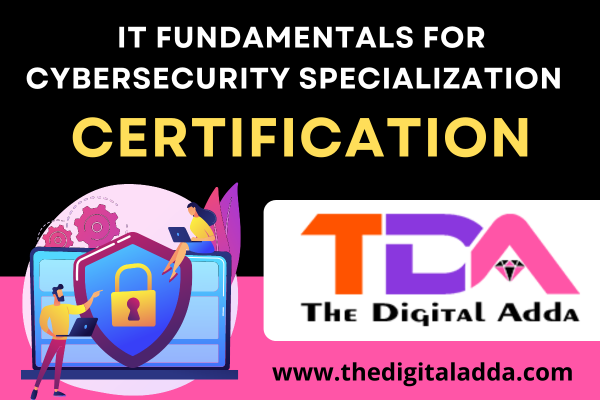IT Fundamentals for Cybersecurity Specialization Certification
“IT Fundamentals for Cybersecurity Specialization” is a comprehensive educational program that focuses on introducing learners to the foundational concepts, principles, and practices of information technology (IT) within the context of cybersecurity. The specialization aims to provide individuals with a strong understanding of the essential elements required to build a solid foundation in both IT and cybersecurity. Here’s an explanation of what this specialization typically covers:
- Introduction to IT Fundamentals: The program usually starts with an overview of fundamental IT concepts. Learners are introduced to the basics of computer hardware, software, networks, operating systems, and data management. This foundation sets the stage for deeper exploration into cybersecurity topics.
- Network Security: The specialization covers the basics of computer networks and their vulnerabilities. Learners learn about network protocols, devices, and security measures like firewalls, intrusion detection systems (IDS), and intrusion prevention systems (IPS). They understand how to protect networks from unauthorized access and data breaches.
- Cyber Threats and Attacks: Participants are introduced to various types of cyber threats and attacks, including malware, phishing, ransomware, social engineering, and more. They learn how these threats can compromise security and gain insights into effective strategies for defense and prevention.
- Cryptography: Cryptography is a fundamental aspect of cybersecurity. The program explains the principles of encryption and decryption, along with different encryption algorithms. Learners understand how cryptography helps protect sensitive data and communications.
- Authentication and Access Control: This topic focuses on the methods used to verify the identity of users and control their access to systems and data. Learners explore various authentication factors like passwords, biometrics, and multi-factor authentication (MFA).
- Security Policies and Compliance: Participants learn about the importance of security policies in an organization. They understand how compliance with regulations and standards plays a crucial role in maintaining a secure IT environment.
- Incident Response and Recovery: In the event of a security breach, it’s important to have a well-defined incident response plan. Learners discover how to identify, respond to, and recover from cybersecurity incidents effectively.
- Ethical and Legal Considerations: The specialization addresses ethical issues related to cybersecurity and the legal aspects of cyber activities. This includes discussions on privacy, cybercrime laws, and ethical hacking.
- Security Best Practices: Throughout the program, learners are introduced to best practices for maintaining cybersecurity. This includes regular software updates, secure coding practices, and safe browsing habits.
- Hands-on Labs and Simulations: Practical hands-on labs, exercises, and simulations are often included to give learners a chance to apply theoretical knowledge in real-world scenarios. This can involve setting up basic network security configurations, analyzing simulated cyberattacks, and more.
Overall, “IT Fundamentals for Cybersecurity Specialization” provides individuals with a solid foundation in both IT concepts and cybersecurity principles. It’s a valuable starting point for anyone looking to enter the field of cybersecurity or gain a better understanding of how to protect digital assets and information.











